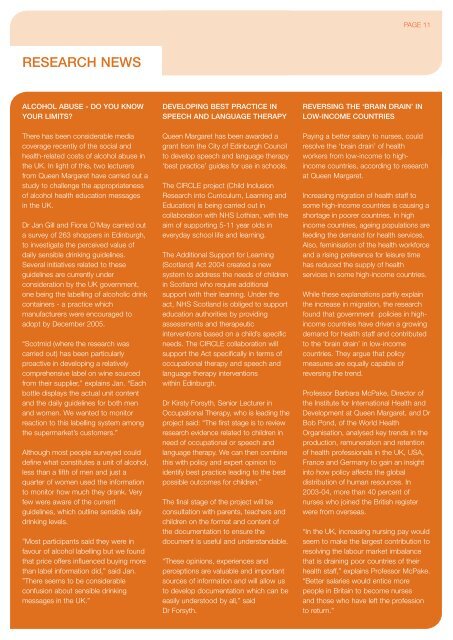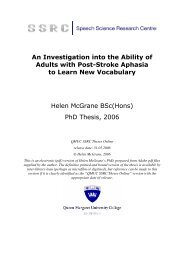QM News 63 (pdf 752KB) - Queen Margaret University
QM News 63 (pdf 752KB) - Queen Margaret University
QM News 63 (pdf 752KB) - Queen Margaret University
You also want an ePaper? Increase the reach of your titles
YUMPU automatically turns print PDFs into web optimized ePapers that Google loves.
PAGE 11<br />
RESEARCH NEWS<br />
ALCOHOL ABUSE - DO YOU KNOW<br />
YOUR LIMITS?<br />
There has been considerable media<br />
coverage recently of the social and<br />
health-related costs of alcohol abuse in<br />
the UK. In light of this, two lecturers<br />
from <strong>Queen</strong> <strong>Margaret</strong> have carried out a<br />
study to challenge the appropriateness<br />
of alcohol health education messages<br />
in the UK.<br />
Dr Jan Gill and Fiona O’May carried out<br />
a survey of 2<strong>63</strong> shoppers in Edinburgh,<br />
to investigate the perceived value of<br />
daily sensible drinking guidelines.<br />
Several initiatives related to these<br />
guidelines are currently under<br />
consideration by the UK government,<br />
one being the labelling of alcoholic drink<br />
containers - a practice which<br />
manufacturers were encouraged to<br />
adopt by December 2005.<br />
“Scotmid (where the research was<br />
carried out) has been particularly<br />
proactive in developing a relatively<br />
comprehensive label on wine sourced<br />
from their supplier,” explains Jan. “Each<br />
bottle displays the actual unit content<br />
and the daily guidelines for both men<br />
and women. We wanted to monitor<br />
reaction to this labelling system among<br />
the supermarket’s customers.”<br />
Although most people surveyed could<br />
define what constitutes a unit of alcohol,<br />
less than a fifth of men and just a<br />
quarter of women used the information<br />
to monitor how much they drank. Very<br />
few were aware of the current<br />
guidelines, which outline sensible daily<br />
drinking levels.<br />
”Most participants said they were in<br />
favour of alcohol labelling but we found<br />
that price offers influenced buying more<br />
than label information did,” said Jan.<br />
”There seems to be considerable<br />
confusion about sensible drinking<br />
messages in the UK.”<br />
DEVELOPING BEST PRACTICE IN<br />
SPEECH AND LANGUAGE THERAPY<br />
<strong>Queen</strong> <strong>Margaret</strong> has been awarded a<br />
grant from the City of Edinburgh Council<br />
to develop speech and language therapy<br />
‘best practice’ guides for use in schools.<br />
The CIRCLE project (Child Inclusion<br />
Research into Curriculum, Learning and<br />
Education) is being carried out in<br />
collaboration with NHS Lothian, with the<br />
aim of supporting 5-11 year olds in<br />
everyday school life and learning.<br />
The Additional Support for Learning<br />
(Scotland) Act 2004 created a new<br />
system to address the needs of children<br />
in Scotland who require additional<br />
support with their learning. Under the<br />
act, NHS Scotland is obliged to support<br />
education authorities by providing<br />
assessments and therapeutic<br />
interventions based on a child’s specific<br />
needs. The CIRCLE collaboration will<br />
support the Act specifically in terms of<br />
occupational therapy and speech and<br />
language therapy interventions<br />
within Edinburgh.<br />
Dr Kirsty Forsyth, Senior Lecturer in<br />
Occupational Therapy, who is leading the<br />
project said: “The first stage is to review<br />
research evidence related to children in<br />
need of occupational or speech and<br />
language therapy. We can then combine<br />
this with policy and expert opinion to<br />
identify best practice leading to the best<br />
possible outcomes for children.”<br />
The final stage of the project will be<br />
consultation with parents, teachers and<br />
children on the format and content of<br />
the documentation to ensure the<br />
document is useful and understandable.<br />
“These opinions, experiences and<br />
perceptions are valuable and important<br />
sources of information and will allow us<br />
to develop documentation which can be<br />
easily understood by all,” said<br />
Dr Forsyth.<br />
REVERSING THE ‘BRAIN DRAIN’ IN<br />
LOW-INCOME COUNTRIES<br />
Paying a better salary to nurses, could<br />
resolve the ‘brain drain’ of health<br />
workers from low-income to highincome<br />
countries, according to research<br />
at <strong>Queen</strong> <strong>Margaret</strong>.<br />
Increasing migration of health staff to<br />
some high-income countries is causing a<br />
shortage in poorer countries. In high<br />
income countries, ageing populations are<br />
feeding the demand for health services.<br />
Also, feminisation of the health workforce<br />
and a rising preference for leisure time<br />
has reduced the supply of health<br />
services in some high-income countries.<br />
While these explanations partly explain<br />
the increase in migration, the research<br />
found that government policies in highincome<br />
countries have driven a growing<br />
demand for health staff and contributed<br />
to the ‘brain drain’ in low-income<br />
countries. They argue that policy<br />
measures are equally capable of<br />
reversing the trend.<br />
Professor Barbara McPake, Director of<br />
the Institute for International Health and<br />
Development at <strong>Queen</strong> <strong>Margaret</strong>, and Dr<br />
Bob Pond, of the World Health<br />
Organisation, analysed key trends in the<br />
production, remuneration and retention<br />
of health professionals in the UK, USA,<br />
France and Germany to gain an insight<br />
into how policy affects the global<br />
distribution of human resources. In<br />
2003-04, more than 40 percent of<br />
nurses who joined the British register<br />
were from overseas.<br />
“In the UK, increasing nursing pay would<br />
seem to make the largest contribution to<br />
resolving the labour market imbalance<br />
that is draining poor countries of their<br />
health staff,” explains Professor McPake.<br />
“Better salaries would entice more<br />
people in Britain to become nurses<br />
and those who have left the profession<br />
to return.”

















